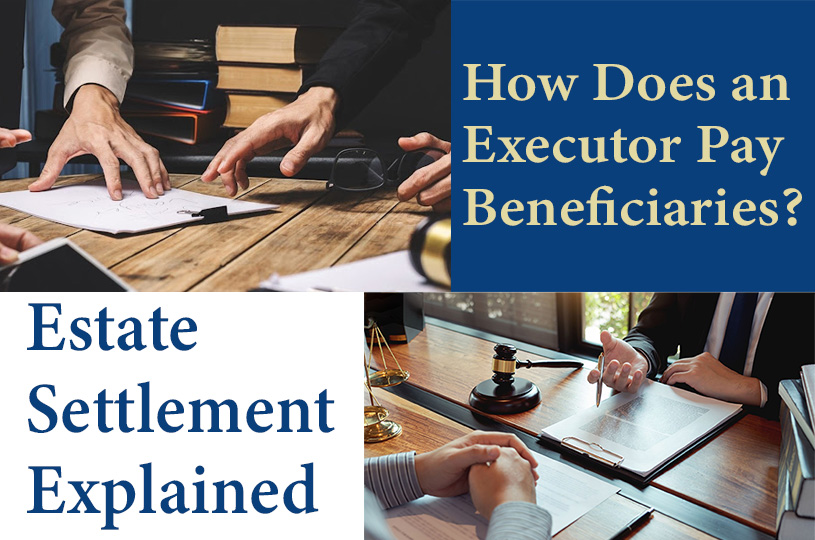Distributing assets after someone’s death can be an emotional and complex process. Executors play a pivotal role in this procedure, ensuring that beneficiaries receive their rightful inheritances as outlined in the deceased’s will. However, this responsibility requires understanding legal protocols, resolving debts, and adhering to court mandates.
In this guide, we’ll address the primary question, “How does an executor pay beneficiaries?”, alongside related topics to provide clarity and direction for executors and beneficiaries alike.
What Is the Role of an Executor in Estate Settlement?
An executor is the person designated in a will to manage the deceased’s estate. Their responsibilities include:
- Identifying and valuing estate assets.
- Settling outstanding debts, taxes, and expenses.
- Ensuring beneficiaries receive their entitled inheritances as per the will.
For executors unsure of their legal obligations, consulting an experienced estate attorney is crucial. The team at English Law Firm can guide you through this process.
How Does an Executor Pay Beneficiaries?
Once the executor has completed the legal and financial steps involved in probate, they can distribute the estate to beneficiaries. Here’s a breakdown of the process:
1. Inventorying the Estate Assets
The executor must identify, locate, and assess the value of all assets. These typically include:
- Real estate properties.
- Bank accounts.
- Investments and stocks.
- Personal belongings of significant value.
Assets like properties held in trust may avoid probate altogether. Learn more about trust management in our blog on what happens to a house in trust after death.
2. Settling Debts and Taxes
Before beneficiaries are paid, the executor must:
- Clear outstanding debts (e.g., credit cards, loans).
- Pay any applicable estate or inheritance taxes.
- Handle final medical or funeral expenses.
Failure to do so can lead to legal challenges. Executors managing estates with minimal resources can refer to our guide on how to settle an estate with no assets.
3. Obtaining Court Approval
For estates undergoing probate, the executor often requires court approval to distribute assets. This involves presenting financial records and settlement plans for judicial review.
Refer to our article on avoiding probate court for tips on streamlining estate settlements.
4. Distributing Assets to Beneficiaries
Executors distribute assets according to the terms of the will or as directed by the court if there is no will. Payments may include:
- Lump sum cash payments from liquidated assets.
- Transfers of property ownership.
- Allocations of specific heirlooms or valuables.
How Are Beneficiaries Paid From a Will?
Beneficiaries can receive inheritances through various methods:
- Direct Payments: Bank transfers or checks from estate accounts.
- Property Transfers: Official documentation transferring ownership of real estate or vehicles.
- Trust Disbursements: If assets are held in trust, trustees will oversee payments to beneficiaries.
For guidance on probate-related processes, check out house in probate meaning.
How Does the Executor Pay Beneficiaries After Death?
After the court approves asset distribution, the executor follows these steps:
| Step | Description |
| Finalize Debts | Confirm all creditors are paid and retain proof of payment for court records. |
| Liquidate Assets | If the estate lacks liquidity, the executor may need to sell properties or investments. |
| Distribute Funds | Divide remaining funds or property among beneficiaries based on will directives. |
| Document Transfers | Maintain detailed records to prove compliance with legal requirements. |
What Happens if Disputes Arise?
Disputes among beneficiaries can delay payments. Common causes include:
- Claims that the will is invalid.
- Disagreements over asset valuations.
- Accusations of executor misconduct.
In such cases, seeking legal advice is essential. Learn how corporate litigation attorneys can resolve disputes efficiently.
FAQs
1. What is a Petition for Probate?
A petition for probate is a formal request to the court to approve an executor and validate the will. Executors file this document to initiate the probate process. For filing tips, see our blog on how do I file a petition for probate.
2. How Long Does It Take to Pay Beneficiaries?
Estate settlements can take months or years depending on factors like:
- Complexity of assets.
- Resolution of creditor claims.
- Legal challenges.
3. Can Beneficiaries Force Payment?
Beneficiaries can petition the court if the executor delays payment without valid reasons. Executors should prioritize transparency to avoid disputes.
4. What If the Estate Lacks Sufficient Funds?
When debts exceed estate value, beneficiaries may receive reduced or no payouts. Executors can find solutions in our article on how to settle an estate with no assets.
5. Do Executors Get Paid?
Yes, executors are entitled to compensation for their services, typically a percentage of the estate value. This varies by state law.
Conclusion
Paying beneficiaries is a critical responsibility of an executor, requiring meticulous planning and compliance with legal obligations. For those navigating estate settlements, legal support can make the process smoother and less stressful.At English Law Firm, our experienced attorneys offer comprehensive estate planning and probate services tailored to Texas, Georgia, and Mississippi residents. Contact us today for guidance through every step of the executor’s journey.

